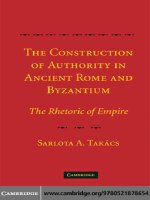cambridge university press leadership and management in china philosophies theories and practices jul 2008 kho tài liệu bách khoa
Bạn đang xem bản rút gọn của tài liệu. Xem và tải ngay bản đầy đủ của tài liệu tại đây (1.97 MB, 327 trang )
This page intentionally left blank
|
Leadership and
Management in China
With the rise of China in the global economy, it has never been more
important for business leaders to understand Chinese leadership philosophies and practices. This is the first book to explain how ancient Chinese
thinking and Western thought have shaped the development of leadership
styles in China. Leadership theories associated with Confucianism, Daoism,
Legalism, the Art of War, and the writings of Mao and Deng are analyzed
by both Chinese and Western experts. To set this in a modern business
context, the book includes interviews with top executives, who reflect on
how their business values are affected by ancient Chinese philosophers,
modern Chinese leaders, and Western management writers and thinkers.
The book also includes research on paternalistic leadership as practiced by
business leaders in Taiwan, Hong Kong, and mainland China.
Leadership and Management in China provides a significant step forward in understanding the complex and varied nature of leadership styles
in modern Chinese business.
c h a o - c h u a n c h e n is Professor of Management and Global Business
at Rutgers Business School, Rutgers University.
y u e h - t i n g l e e is Professor of Psychology and Dean of the College of
Arts and Sciences at the University of Toledo.
Leadership and
Management in China
Philosophies, Theories, and Practices
Edited by
chao-chuan chen and yueh-ting lee
CAMBRIDGE UNIVERSITY PRESS
Cambridge, New York, Melbourne, Madrid, Cape Town, Singapore, São Paulo
Cambridge University Press
The Edinburgh Building, Cambridge CB2 8RU, UK
Published in the United States of America by Cambridge University Press, New York
www.cambridge.org
Information on this title: www.cambridge.org/9780521879613
© Cambridge University Press 2008
This publication is in copyright. Subject to statutory exception and to the provision of
relevant collective licensing agreements, no reproduction of any part may take place
without the written permission of Cambridge University Press.
First published in print format 2008
ISBN-13 978-0-511-40909-7
eBook (EBL)
ISBN-13 978-0-521-87961-3
hardback
ISBN-13 978-0-521-70543-1
paperback
Cambridge University Press has no responsibility for the persistence or accuracy of urls
for external or third-party internet websites referred to in this publication, and does not
guarantee that any content on such websites is, or will remain, accurate or appropriate.
To the memory of Jim Meindl: great teacher, collaborator,
and friend
To our beloved wives: Wen-hua Ren and Fong Wei
Contents
List of figures
page ix
List of tables
x
List of contributors
xi
Preface
xv
Acknowledgments
Introduction: The diversity and dynamism of Chinese
philosophies on leadership
Chao-chuan Chen and Yueh-ting Lee
Part I
1
2
1
The Confucian foundations
The Confucian and Mencian philosophy of benevolent
leadership
Xin-hui Yang, Yan-qin Peng, and Yueh-ting Lee
31
Bridging Confucianism and Legalism: Xunzi’s philosophy
of sage-kingship
Yan-qin Peng, Chao-chuan Chen, and Xin-hui Yang
51
Part II
Alternative traditional Chinese leadership
philosophies
3
Daoist leadership: theory and application
Yueh-ting Lee, Ai-guo Han, Tammy K. Byron, and
Hong-xia Fan
4
Leadership theory of Legalism and its function in
Confucian society
Kwang-kuo Hwang
5
xvii
Strategic leadership of Sunzi in the Art of war
Hai-fa Sun, Chao-chuan Chen, and Shi-he Zhang
83
108
143
vii
viii
Contents
Part III
6
7
8
9
Modern Chinese leadership theories and practices
Paternalistic leadership in Chinese organizations:
research progress and future research directions
Jiing-lih Farh, Jian Liang, Li-fang Chou, and
Bor-shiuan Cheng
The leadership theories and practices of Mao Zedong and
Deng Xiaoping
Xin-an Lu and Jie Lu
Chinese traditions and Western theories: influences on
business leaders in China
Zhi-xue Zhang, Chao-chuan Chen, Leigh Anne Liu, and
Xue-feng Liu
Linking Chinese leadership theory and practice to
the world: leadership secrets of the Middle Kingdom
George Bear Graen
Index
171
206
239
272
298
Figures
I.1 Chinese and Western philosophical influences on
modern Chinese leadership
1.1 Confucian model of benevolent leadership
2.1 Xunzi’s philosophy of human nature
3.1 The Daoist model of wateristic personality
(Daoist Big Five)
4.1 The Confucian ethical system of benevolence–
righteousness–propriety for ordinary people
5.1 Sunzi’s model of strategic situationalism
6.1 Farh and Cheng’s model of paternalistic leadership
6.2 A multilevel model of paternalistic leadership
8.1 A summary model of Chinese business leaders’
management philosophies
9.1 A leadership network
page 16
38
56
94
124
158
175
198
260
290
ix
Tables
I.1 Major schools of philosophy in Ancient China
page 2
4.1 A comparison between five major aspects of
Confucianism and Legalism
128
5.1 Thematic contents of the Art of war
147
5.2 Frequency of keywords in the Art of war
152
5.3 Examples of the humanist foundation of
strategic leadership
154
6.1 Distributions of ideal leader choices and actual
leaders across the eight types of paternalistic leader
188
6.2 Means of trust in supervisor and satisfaction with
supervision across paternalistic leader types
190
6.3 Revised construct domain of paternalistic leadership
dimensions
194
8.1 Frequencies of management philosophical notions
mentioned by the thirty-five interviewed business leaders
244
9.1 Chronology of competing social structures in China
277
9.2 Leadership in mainland China
281
9.3 Ten limiting characteristics of a traditional SOE
283
9.4 Third-culture management issues in
Sino-Western ventures
294
x
Contributors
tammy k. byron
PhD candidate and Lecturer in History
University of Arkansas
chao-chuan chen
Professor of Organization Management
Rutgers University
bor-shiuan cheng
Professor of Psychology
National Taiwan University
li-fang chou
Assistant Professor of Management
Yuan Ze University, Taiwan
hong-xia fan
PhD candidate and Lecturer in Management
Chinese Academy of Sciences and University of Illinois
jiing-lih farh
Professor of Management
The Hong Kong University of Science and Technology
george bear graen
Emeritus Professor of Organizational Psychology,
University of Illinois at Urbana-Champaign
ai-guo han
Professor of Linguistics
Rowan University
xi
xii
List of contributors
kwang-kuo hwang
Professor of Psychology
National Taiwan University
yueh-ting lee
Professor of Psychology
University of Toledo
jian liang
Assistant Professor of Management
The Hong Kong University of Science and Technology
leigh anne liu
Assistant Professor of International Business
Georgia State University
xue-feng liu
Assistant Professor of Organization Management
Shanghai University of Finance and Economics
jie lu
Professor of Public Administration
China Academy of Management Science
xin-an lu
Associate Professor of Human Communication Studies
Shippensburg University
yan-qin peng
Professor of Psychology
Suzhou University
hai-fa sun
Professor of Management
Sun Yat-Sen University
xin-hui yang
Professor of Psychology
Nanjing Normal University
List of contributors
shi-he zhang
Professor of Administration
Chong Qin College of Administration
zhi-xue zhang
Associate Professor of Organization Management
Peking University
xiii
Preface
This is the first book to our knowledge that introduces, explains,
and theorizes on Chinese leadership philosophies and practices. The
contributors include well-established mainland and overseas Chinese
leadership and management scholars such as Larry Farh from the
Hong Kong University of Science and Technology and Kwang-kuo
Hwang from the National Taiwan University. The Chinese authors
were joined by Western scholars including George Graen, renowned
for his Leader–Member Exchange Theory and his cross-cultural
leadership research and consulting.
At a time when China is becoming more central in a globalizing
world economy, business managers as well as scholars from outside
China increasingly feel the importance of understanding the thoughts
and views of Chinese leadership and management. As one of the oldest
civilizations in the world, and with the largest population, China has
produced internationally known statesmen, philosophers, thinkers,
and leaders; yet, among the vast volume of literature on leadership
within and outside China, we see so little on Chinese leadership, and
by Chinese scholars. This book represents a significant step toward
filling a serious gap in the teaching, research, and practice of leadership and management.
The book has three parts. It begins with Confucian philosophical
foundations of leadership theory and practice in Ancient China (Part I).
Part II presents alternative ancient philosophical approaches to leadership, such as Daoism, Legalism, and the Art of war. Part III consists of
modern and contemporary Chinese leadership theories and practices
such as paternalistic leadership, Mao’s revolutionary theory and practice, and Deng’s theory and practice of economic reform. An interview
study led by Zhi-xue Zhang, specially designed for this book, is
featured in Chapter 8, and it reports how top business executives in
mainland China draw philosophical insights on leadership and management from both Chinese and Western sources. In the final chapter
xv
xvi
Preface
George Graen comments on the significance of Chinese leadership
theories for the wider world.
The contributors were drawn to this project by a common mission
to present to the world something that researchers, students, consultants, and practitioners can turn to for a better understanding of
Chinese leadership perspectives. This book, we believe, has a lot to
offer to those who do business with the Chinese in China, Asia, or
anywhere in the world, to those who are or aspire to be multinational
business leaders, and to those scholars who are seeking leadership
universals or peculiarities.
Acknowledgments
The idea of a book on Chinese leadership philosophies came about
six years ago in 2002 when Jim Meindl and I met at the Academy of
Management Meetings (chatting with Jim was always one of the
highlights at the Academy and I miss it so much now that he is gone).
We continued to talk about this idea on the phone and finally decided
to do it in 2003. I started to make contacts with scholars from Chinese
universities, who, we believed, would bring more indigenous perspectives to the topics. After many phone conversations and email
exchanges I planned to go to SUNY at Buffalo in early July 2004 to
meet with Jim and talk about the book and other research interests.
He had invited me several times to go back to visit my alma mater and
I was looking forward to it. Little did I know that my trip would be
to attend his funeral. Jim died unexpectedly of a heart attack. I was so
shocked and saddened that I could not bear the thought of doing the
book as it would be such a painful reminder of his tragic departure.
The book project was shelved for a year as I was grieving for the loss
of a great teacher, collaborator, and a close friend.
Time did not heal (contrary to what people usually say of personal
tragic losses) because it still hurts every time I realize Jim is gone. But
time did channel my sadness, regret, and helplessness into motivation
to complete the unfinished work, about which Jim was passionate.
I felt I owed it to him and to readers of Chinese leadership and
management to carry out the book project. In the year 2006, recovered
and reenergized, I picked up everything and started in earnest to
work on it. During this time, Yueh-ting Lee, a friend and one of the
contributors to the book, came to my aid as a coeditor. His knowledge
of classic Chinese literature was reassuring to me. George Graen,
a scholar of Japanese and Chinese cultures, graciously agreed to write
a chapter connecting the Chinese theories to the international world,
and to do that he read each and every chapter of the book and
provided timely and valuable feedback. To them I am deeply grateful.
xvii
xviii
Acknowledgments
Thanks are also due to Larry Farh, Kwang-kuo Hwang, and
Zhi-xue Zhang for contributing their chapters and for their thoughtful
comments on an earlier draft of the Introduction. Beside them, I wish
to thank other contributors such as Jie Lu, Xin-an Lu, Yan-qin Peng,
Hai-fa Sun, Xin-hui Yang, and Shi-he Zhang for their understanding,
patience, and cooperativeness when the book was delayed.
I am grateful to Mary Child, a good friend and a true professional,
from whom I received so much general advice about book editorship.
I truly appreciate the help of Shan Haarsager, Yueh-ting Lee’s administrative assistant, who gave me quick turnarounds when proofreading
parts of the typescript at short notice. Thanks are also due to Caroline
Murray and Paula Parish at Cambridge University Press and to Chris
Doubleday, the copy-editor, for their professional assistance.
As is quite typical of my research, this book is a collaborative family
effort. My wife, Wen-hua Ren, shared her time helping me search and
obtain relevant literature, let me bounce thoughts and ideas off her,
and shared my joy and worry. My niece, Amy Hui Wang, volunteered
her precious vacation time to help me put the individual chapters into
a single file for submission. I fully utilized my son, Ken Chen’s, superb
skill in drawing figures. All the help from colleagues, friends, and
family made my first experience of book-editing so much less daunting
and more fun. To all of them I extend my deepest appreciation and
gratitude.
Chao-chuan Chen
|
Introduction: The diversity and
dynamism of Chinese philosophies
on leadership
chao-chuan chen and yueh-ting lee
O
V E R 8000 years ago, the fundamental religious belief in
China was a form of shamanism (Lee and Wang, 2007;
Xu, 1991; Yuan, 1988). Shamanism is the spiritual belief
or practice of a shaman who can connect the inner world with the
outer world, the body with the soul, and the living with the dead. As
time went on, Confucianism and Daoism developed out of shamanism
as two of the fundamental Chinese belief systems and these have
affected Chinese behavior and thinking almost on a daily basis for
thousands of years (see Hsu, 1981). When the formerly subordinate
states of the Zhou dynasty (841–256 BCE) began to break away to
create competing states, chaotic political and social changes ravaged
China. Accompanying these social and political changes were many
schools of thoughts, including Confucianism (Chapters 1 and 2),
Daoism (Chapter 3), Legalism (Chapter 4), and the school of military
arts philosophy (Chapter 5), known in history as the ‘‘100 Schools of
Thought’’ (see Table I.1). Each school (jia) was headed by its own
master or masters (zi), and had academics and disciples to study, teach,
and propagate their respective philosophical and ideological perspectives
and views. These masters contested to offer advice, primarily to rulers,
on expanding powers and restoring peace and order to society. It was
common for rulers or leaders to receive scholars or advisors from different schools and hear their debates on ways of governing. The ancient
leadership philosophies featured in this book come from the major
philosophical schools of thought during the historical period.
Despite this, when Western scholars think of Chinese leadership or
Chinese culture in general there is often a serious lack of appreciation
of the diversity and dynamism in Chinese philosophies and ideologies:
Confucianism is for many the shorthand for Chinese culture. In this
book, Chinese cultural diversity and dynamism and, by extension, the
diversity and dynamism of Chinese leadership thinking, strike us most
1
Mozi and the knights
Sunzi, Sun Bing, and the war
strategists
School of the Art of
War (Bing Jia)
Sources: Based on the work of Fung (1948: 30–37) and Lee (2000: 1066).
Relativity and
universals
Man-made laws and
rules
A close-knit
organization and
discipline; no war
War is necessary for
peace
Mohism (Mo Jia)
School of Name
(Ming Jia)
Legalism (Fa Jia)
Yin–yang opposites
Fu Xi, King Wen and the
practitioners of occult arts
and astronomy
Hui Shi, Kong Sun Long and
the debaters
Hanfei and the men of methods
School of Yin–Yang
(Yin–Yang Jia)
Naturalistic, or the
way it is
Social order or
hierarchy
Laozi, Zhuangzi, Lie zi and
the hermits
Daoism (Dao Jia)
Basic focus/meaning
Confucianism (Ru Jia) Confucius (Kongzi), Mencius
(Menzi), and the literati
Pioneers or representatives
Schools
Table I.1. Major schools of philosophy in Ancient China.
The best way to win a war is to defeat enemies
without actual fighting or killing
All-embracing love and technology to
prevent war
Clear-cut rewards and punishments
Dao (the Way), de (morality), zi ran
(nature), shui (water), wei wu-wei
(active non-action)
ren (humanity), yi (righteousness), li (ritual),
zhi (knowledge), xin (trust), and xiao
(filial piety)
The Book of Change as well as the five
elements (i.e., metal, wood, water, fire,
and soil)
‘‘A white horse is not a horse’’
Examples
Introduction
3
forcefully and convincingly. From the beginning, there was not just
one Chinese thought or just one Chinese philosophy. The first part of
this book features three major philosophies as related to statesmanship and leadership: Confucianism, Daoism, and Legalism. While each
school of philosophy is analyzed in its own chapter, we will here
discuss their differences and similarities on some fundamental issues
concerning human nature and social systems, and will also discuss
Sunzi’s Art of war as it relates to these three philosophies (see also
Chapter 5). We then discuss how modern Chinese leadership theories
and practices have been affected by traditional Chinese and Western
thoughts on leadership and management. These modern Chinese
leadership theories and practices include the revolutionary theory of
Mao and the economic reform theory of Deng (Chapter 7), paternalistic
leadership (Chapter 6), and philosophical thoughts by current business
executives on organization, leadership, and management (Chapter 8),
and conclude with a commentary (Chapter 9) by a Western student of
modern Chinese leadership. Clearly, the twenty-first-century leadership in China is not well understood by the outside world. Such lack
of understanding contributes to the tensions between leaders and
managers inside and outside of the Middle Kingdom. That such a
situation has existed for the last century and more is expected given
the recent depression of China’s economy and struggles with foes both
inside and outside of China. At the dawn of the twenty-first century
this ignorance of leadership in China is unforgivable. This book is an
attempt by Chinese scholars to begin the process of examining Chinese
philosophies and theories of leadership from indigenous perspectives.
Due diligence requires a deeper understanding of the new, the emerging,
and the traditional lessons of leadership.
Traditional philosophical perspectives on leadership
Human goodness vs. badness and the rule of virtue vs. law
Confucius and Mencius, the two founding fathers of Confucianism,
believed in human goodness; that is, humans are born with natural
kindheartedness. As evidence, Mencius pointed to human beings’
natural, instinctive compassion shown to others suffering, their shame
over evil deeds, and their ability to know right from wrong. Human
beings therefore have a natural inclination to think and act in ways
4
Chao-chuan Chen and Yueh-ting Lee
that follow the moral and social norms and benefit society. Bad
behaviors like disregard of others, disobedience, and violence are
unnatural distortions of human goodness caused by social conditions
and by lack of moral education.
Based on the human goodness assumption, Confucius and Mencius
advocated that the ideal kingship and government are benevolence
toward the common people and stressed that leaders should rely on
education to reinforce, extend, and further develop human goodness.
The assumption of human goodness was contested and even despised
by other schools of thought such as the Legalists, who pointed to
human selfish desires and feelings and criminal acts of theft, robbery,
and murder as evidence of human badness. On the basis of human
badness, the Legalists contended that morality is hypocritical and
useless and advocated relying on the iron fist to maintain social order.
This strong challenge to human goodness might therefore undermine
the viability of the tenets of Confucian philosophy of benevolence
and the rule of virtue. Xunzi, a Confucianist who nevertheless bridged
Confucianism and Legalism, proposed a coherent philosophy that
decoupled human goodness from benevolent government. While
upholding the general philosophy of benevolent sagehood, Xunzi
argued vehemently against Mencius’ thesis of human goodness and
proposed an explicit antithesis of human badness. Xunzi pointed to
human hedonistic desires and emotions, such as wanting food when
hungry and warmth when cold, as natural instincts. Because desires
are many and resources are few, natural instincts, if left uninhibited, are
bound to lead to aggression and violence, and hence to social disorder
and disintegration. Xunzi conceded that humans, despite their basic
hedonistic motives, are equipped with the capacity for consideration,
which allows them to develop goodness, conceived as the acquired
human nature. Human goodness therefore is learned, developed, and
cultivated through concerted efforts at the individual and institutional
levels. By acknowledging or even insisting on the badness of human
nature, Xunzi elevated even more the necessity for education, morality,
and ritual and conduct propriety, upholding the rule of virtue and
morality as advocated by Confucius and Mencius. Furthermore, Xunzi
emphasized the supplementary function of rules, regulations, and even
punishment.
Paradoxically, Xunzi’s theory of human badness serves to legitimize
human self-interest as an important factor in leadership. According
Introduction
5
to Xunzi’s theory of human badness, peasants and sage-kings are all
born alike with basic egoistic and hedonistic desires and interests.
What distinguishes the sage and the noble from the common or the
petty is first and foremost the degree of goodness, namely, learned
virtues that result from self-cultivation. Xunzi never claimed that
acquired good nature could and should eliminate or replace the basic
born nature. In places, his philosophy smacked of an instrumental view
of morality, in suggesting that the cultivated person has not only a more
benevolent but also a more effective way of satisfying basic needs.
Xunzi’s arguments of human badness, his recognition of self-interest,
and his emphasis on rule-based propriety serve as a bridge between
Confucianism and Legalism, the major proponent of which is Hanfei,
Xunzi’s student. Hanfei, a standard-bearer of the Legalist school of
thought, preferred strict and effective enforcement of laws over the
exhortation of Confucian moral values. His Legalist philosophy of
leadership and government was based on the assumption of human
self-interest, especially its competitive and subversive side. Unlike
classic Confucianists, who based a philosophy of benevolence on
moral virtues and ritual propriety, Hanfei had no confidence in
morality and did not care for rituals. Instead he believed in power, laws,
and manipulation as major means of government and leadership. The
Legalist philosophy shared the vision of creating stable, peaceful, and
prosperous states, though by a different means, namely, the rule of
law under the sovereignty of the emperor. Hanfei believed in the
separation of public and private self-interest and proposed fair and
effective ways of exercising power and laws. For example, laws and
regulations must be objective and universally enforced so as to be fair
and laws should be practical, enforceable, and well publicized so as to
be effective.
Where does Daoism stand regarding human goodness and badness?
It was not a central concept in Daoism but we may infer a Daoist
position on this issue from writings by Laozi and Zhuangzi on the
relationship between humans and the natural universe. The Daoists
assumed a unified and coherent universe and believed that nature is
guided by immanent patterns and forces, known as the Dao (the Way),
rather than by any omnipotent external creator. Human beings are
constituent members of the natural universe, not its masters or
members with privileges. The natural way of the universe, the Dao,
should also be the way of human existence and human relations.









